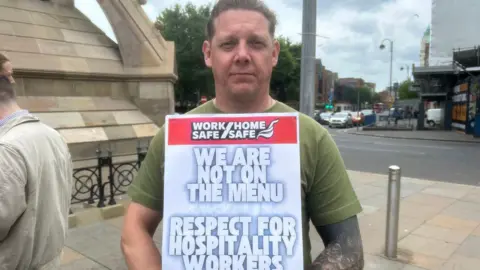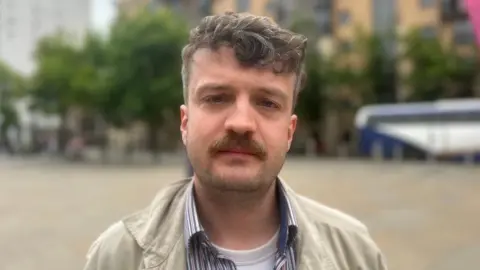Hospitality workers experiencing 'horrendous harassment'
 BBC
BBCHospitality workers have described harassment in the industry as "horrendous".
It comes as a union has called for zero tolerance towards workplace harassment and free transport home for late shift workers.
Unite the union has described sexual comments, unwanted advancements and degrading situations for staff.
Branch secretary for Unite Hospitality Nathan Young said it was important for hospitality workers to say "no more".
Mr Young, who has worked in the sector for a decade, in cafes and fast-food outlets, said: "Some of these issues have been endemic and have been endemic in the industry for a very long time.
"There hasn't been change. People come into the industry often young, often not really sure of their rights.
"The issues that I see now are the same issues that there were years ago. Even with larger societal changes around feminist issues or social issues, that kind of thing."

Mr Young said many young people begin working in hospitality, where they encounter bad experiences from customers and management.
He said a number of issues have been raised by workers.
"It could be anything from making sexual comments repeatedly, making advances to people who have rejected people multiple times," he said.
"There was one workplace we had where some of the chefs were keeping a list of most 'rapable' front of house staff.
"So it goes from some pretty mild stuff to some really, really horrendous stuff."
Mr Young added: "Management's attitude is very often, 'comments were made outside at a work party so it doesn't concern that us', or 'they're good for the company', or 'we'll have a look into that', or 'you can't really prove that happened on work time'.
"It's things that in any other industry you'd hope would be would be stamped out pretty quickly."
'Duty of care'
Fellow Unite member Ross Lopes-Lister said the union is calling for changes to licensing laws to include a responsibility to ensure night-time economy workers get home safely.
"We think it should be the employers responsibility and part of the licensing laws, that it's their duty of care, that they ensure that their workers get home safe," he said.
"This is the start of something bigger. There needs to be a cultural change, yes there needs to be a change within society that this sort of behaviour goes on full stop - but we have to start somewhere."

Eva Martin from Rosa, a socialist feminist organisation, has previously worked in hospitality.
"This conversation is long overdue," she said.
"It is very much a spectrum, it can range from comments to unwanted physical touch and that can be from both customers and colleagues and I think the realities of power dynamics that exist in hospitality - that's a huge issue that we need to tackle.
"Often most hospitality workers will have personal stories of having experienced abuse, or just unacceptable behaviour from customers.
"Things that might be deemed throwaway comments but are acutely unacceptable and are rooted in sexism or misogyny or racism or transphobia, whatever it may be."
Unite general secretary Sharon Graham said the union was "calling time" on harassment and would not accept workers being abused or "forced to walk home in fear".
Neil Moore, lead regional officer for hospitality workers, said the union wanted to free transport made a condition of every new liquor and entertainment licence.
Legislative power licensing laws lies with The Department for Communities.
